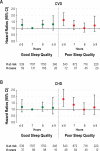Sleep duration and sleep quality in relation to 12-year cardiovascular disease incidence: the MORGEN study - PubMed (original) (raw)
Sleep duration and sleep quality in relation to 12-year cardiovascular disease incidence: the MORGEN study
Marieke P Hoevenaar-Blom et al. Sleep. 2011.
Abstract
Study objectives: We studied sleep duration and sleep quality in relation to cardiovascular disease (CVD) incidence.
Design/setting: Dutch population-based cohort study.
Participants: 20,432 men and women aged 20-65 and with no history of CVD.
Interventions: N/A.
Measurements: Sleep duration and sleep quality were assessed by a self-administered questionnaire. Morbidity data, vital status, and causes of death were obtained through linkage with several national registries. Hazard ratios (HRs) and 95% confidence intervals (95% CIs) were calculated using Cox proportional hazards models.
Results: During 10-15 years of follow-up, 1,486 CVD and 1,148 coronary heart disease (CHD) events occurred. Short sleepers (≤ 6 h) had a 15% higher risk of total CVD (HR: 1.15; 95%CI: 1.00-1.32) and a 23% higher risk of CHD (HR: 1.23 [1.04-1.45]) compared to normal sleepers (7 h) after adjustment for all confounders. Additional adjustment for intermediate biological risk factors attenuated these relative risks to 1.11 (0.97-1.27) for total CVD and to 1.19 (1.00-1.40) for CHD. Short sleepers with poor sleep quality had a 63% higher risk of CVD (HR: 1.63 [1.21-2.19]) and a 79% higher risk of CHD incidence (HR: 1.79 [1.24-2.58]) compared to normal sleepers with good sleep quality, after adjustments for all confounders. We observed no associations between long sleep duration (≥ 9 h) and CVD or CHD incidence.
Conclusions: Short sleepers, especially those with poor sleep quality, have an increased risk of total CVD and CHD incidence. Future investigations should not only focus on sleep duration, but should also take sleep quality into account.
Keywords: Sleep duration; cardiovascular disease incidence; coronary heart disease incidence; sleep quality.
Figures
Figure 1
Hazard ratios (95% CI) of incident CVD (A) and CHD (B) by sleep duration and sleep quality, adjusted for age, sex, smoking, alcohol, coffee, subjective health and educational level; the MORGEN Study, 1993 and 1994.
Comment in
- Are short bad sleep nights a hindrance to a healthy heart?
Cappuccio FP, Miller MA. Cappuccio FP, et al. Sleep. 2011 Nov 1;34(11):1457-8. doi: 10.5665/sleep.1372. Sleep. 2011. PMID: 22043114 Free PMC article. No abstract available.
Similar articles
- Influence of sleep disturbances on age at onset and long-term incidence of major cardiovascular events: the MONICA-Brianza and PAMELA cohort studies.
Gianfagna F, Veronesi G, Bertù L, Cesana G, Grassi G, Stranges S, Callegari C, Ferrario MM. Gianfagna F, et al. Sleep Med. 2016 May;21:126-32. doi: 10.1016/j.sleep.2016.01.007. Epub 2016 Feb 12. Sleep Med. 2016. PMID: 27448483 - Changes in Sleep Patterns, Genetic Susceptibility, and Incident Cardiovascular Disease in China.
Diao T, Liu K, Lyu J, Zhou L, Yuan Y, Yang H, Wu T, Zhang X. Diao T, et al. JAMA Netw Open. 2024 Apr 1;7(4):e247974. doi: 10.1001/jamanetworkopen.2024.7974. JAMA Netw Open. 2024. PMID: 38652473 Free PMC article. - Daytime sleepiness predicts mortality and cardiovascular disease in older adults. The Cardiovascular Health Study Research Group.
Newman AB, Spiekerman CF, Enright P, Lefkowitz D, Manolio T, Reynolds CF, Robbins J. Newman AB, et al. J Am Geriatr Soc. 2000 Feb;48(2):115-23. doi: 10.1111/j.1532-5415.2000.tb03901.x. J Am Geriatr Soc. 2000. PMID: 10682939 - Quantity and quality of sleep and incidence of type 2 diabetes: a systematic review and meta-analysis.
Cappuccio FP, D'Elia L, Strazzullo P, Miller MA. Cappuccio FP, et al. Diabetes Care. 2010 Feb;33(2):414-20. doi: 10.2337/dc09-1124. Epub 2009 Nov 12. Diabetes Care. 2010. PMID: 19910503 Free PMC article. Review. - The Role of Sleep in Cardiovascular Disease.
Jaspan VN, Greenberg GS, Parihar S, Park CM, Somers VK, Shapiro MD, Lavie CJ, Virani SS, Slipczuk L. Jaspan VN, et al. Curr Atheroscler Rep. 2024 Jul;26(7):249-262. doi: 10.1007/s11883-024-01207-5. Epub 2024 May 25. Curr Atheroscler Rep. 2024. PMID: 38795275 Free PMC article. Review.
Cited by
- Judgement of sleep quality of the previous night changes as the day unfolds: A prospective experience sampling study.
Tang NKY, Banks PDW, Sanborn AN. Tang NKY, et al. J Sleep Res. 2023 Jun;32(3):e13764. doi: 10.1111/jsr.13764. Epub 2022 Nov 27. J Sleep Res. 2023. PMID: 36436945 Free PMC article. - Does Subjective Sleep Affect Bone Mineral Density in Older People with Minimal Health Disorders? The PROOF Cohort.
Saint Martin M, Labeix P, Garet M, Thomas T, Barthélémy JC, Collet P, Roche F, Sforza E. Saint Martin M, et al. J Clin Sleep Med. 2016 Nov 15;12(11):1461-1469. doi: 10.5664/jcsm.6266. J Clin Sleep Med. 2016. PMID: 27655463 Free PMC article. - The Link of Self-Reported Insomnia Symptoms and Sleep Duration with Metabolic Syndrome: A Chinese Population-Based Study.
Lin SC, Sun CA, You SL, Hwang LC, Liang CY, Yang T, Bai CH, Chen CH, Wei CY, Chou YC. Lin SC, et al. Sleep. 2016 Jun 1;39(6):1261-6. doi: 10.5665/sleep.5848. Sleep. 2016. PMID: 27070137 Free PMC article. - Sleep duration and risk of cardio-cerebrovascular disease: A dose-response meta-analysis of cohort studies comprising 3.8 million participants.
Huang YM, Xia W, Ge YJ, Hou JH, Tan L, Xu W, Tan CC. Huang YM, et al. Front Cardiovasc Med. 2022 Sep 27;9:907990. doi: 10.3389/fcvm.2022.907990. eCollection 2022. Front Cardiovasc Med. 2022. PMID: 36237900 Free PMC article. - Variability in Sleep Duration and Biomarkers of Cardiovascular Disease Across the Menstrual Cycle.
Dunietz GL, Shedden K, Michels KA, Chervin RD, Lyu X, Freeman JR, Baylin A, O'Brien LM, Wactawski-Wende J, Schisterman EF, Mumford SL. Dunietz GL, et al. Am J Epidemiol. 2023 Jul 7;192(7):1093-1104. doi: 10.1093/aje/kwad060. Am J Epidemiol. 2023. PMID: 36928293 Free PMC article.
References
- Cappuccio FP, Cooper D, D'Elia L, Strazzullo P, Miller MA. Sleep duration predicts cardiovascular outcomes: a systematic review and meta-analysis of prospective studies. Eur Heart J. 2011 In press. - PubMed
- Chang ET. The impact of daytime naps on the relation between sleep duration and cardiovascular events. Arch Intern Med. 2009;169:717. - PubMed
MeSH terms
LinkOut - more resources
Full Text Sources
